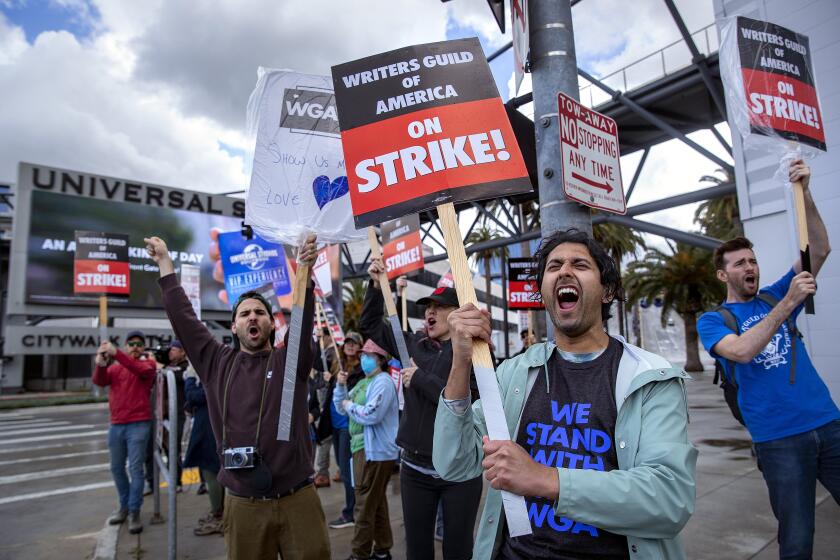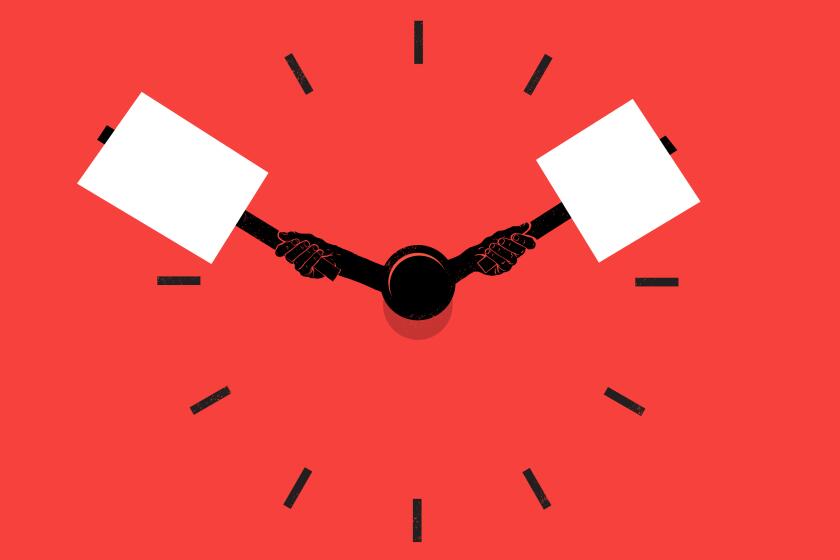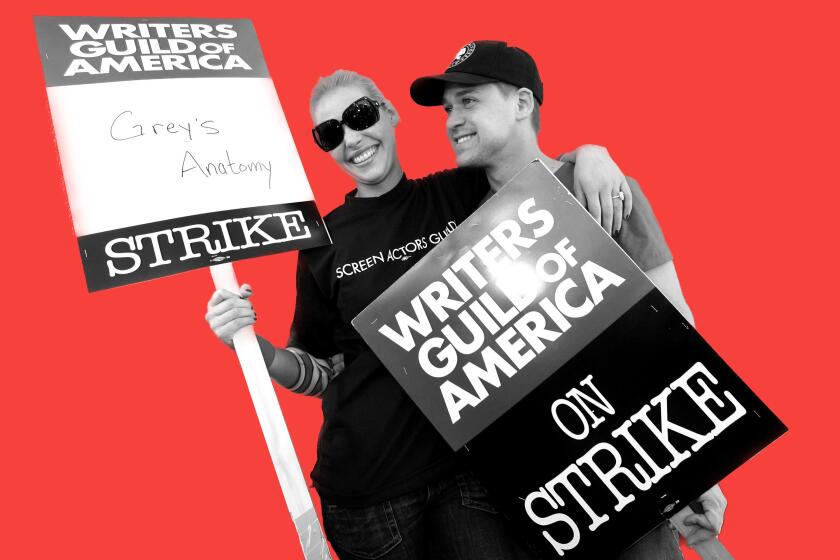With writers strike, studios face a high-stakes endurance test
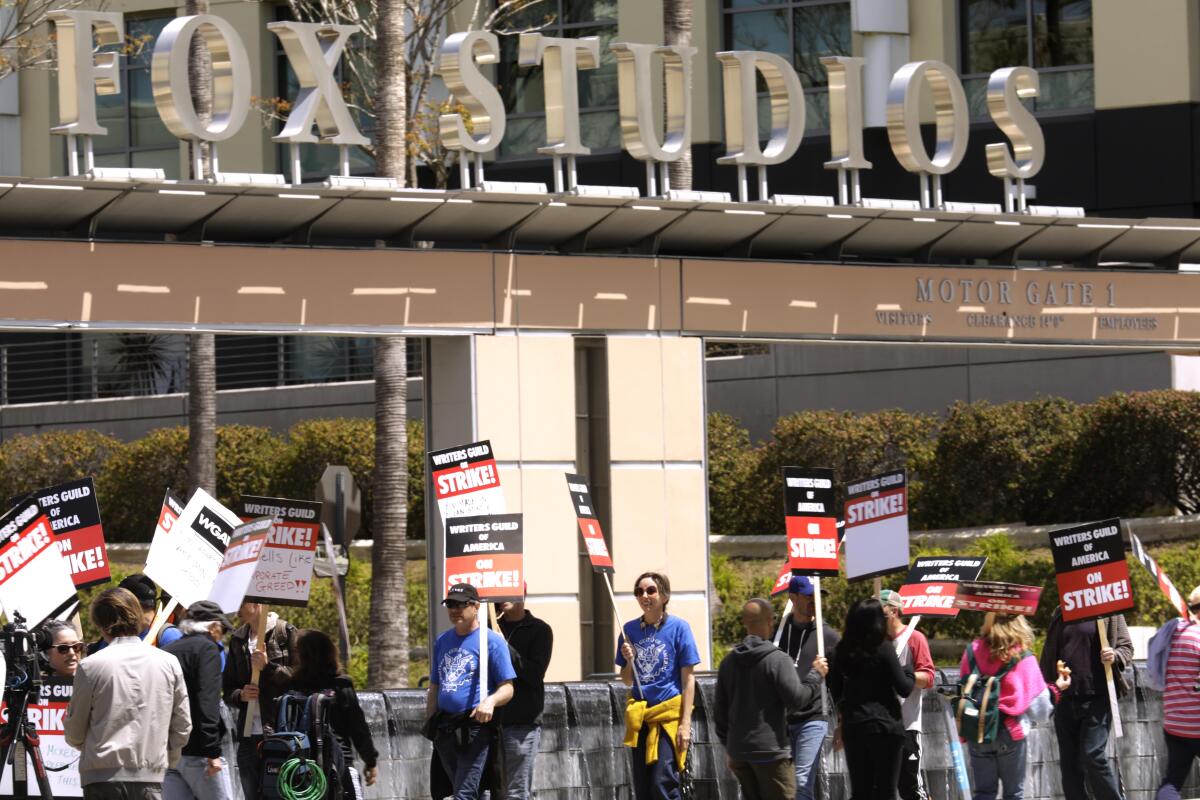
- Share via
Striking writers swarming picket lines say big media companies have made billions in profits from the movies and TV shows they have created — and it’s time for those firms to share the wealth.
Traditional media companies, meanwhile, have lost billions of dollars building streaming services to compete with Netflix, and they say they must cut program expenses, not increase them.
Conflicting narratives, yet both may be true.
“We are in a golden age of spending on television,” Neil Begley, a Moody’s Investors Service senior vice president, said Thursday. “But we’re in a ‘lead age’ for profits. Traditional media companies are facing a new reality, and they’re having a tough time adjusting.”
The strike by the Writers Guild of America — the first since the 2007-2008 walkout that lasted 100 days — is unfolding against a larger backdrop of entertainment industry turmoil and historic workplace shifts. Technology companies, including Amazon, which owns the Prime Video streaming service, have helped steer some economic sectors toward a greater reliance on artificial intelligence and short-term workers, fueling the WGA’s anxieties about pay, job security and future opportunities.
Hollywood writers formed picket lines in L.A. and New York after the Writers Guild of America called a strike for better pay and working conditions.
Traditional entertainment companies, including Paramount Global, which owns CBS and Paramount Pictures, are grappling with their own vulnerabilities. These companies have only recently begun to recover from production shutdowns caused by the COVID-19 pandemic. Cinema chains finally are welcoming back moviegoers with blockbuster releases, including “The Super Mario Bros. Movie.”
Signaling Hollywood’s tenuous state, Wall Street on Thursday punished Paramount after the company announced that it posted a net loss of $1.1 billion in the first quarter and, in an effort to save cash, it was slashing its dividend to shareholders. Paramount stock plummeted more than 28% to $16.40. Investors didn’t care that its Paramount+ streaming service now boasts more than 60 million subscribers.
The sell-off spread to Warner Bros. Discovery, Fox Corp. and Walt Disney Co., which is midway through a wrenching round of layoffs to achieve $5.5 billion in cost savings that Disney Chief Executive Bob Iger has promised.
Hollywood’s writers went on strike, but what were the issues that led to the fallout with the studios and streamers. Here are six issues where talks fell apart.
Investors are worried because traditional media companies still make most of their profits through legacy channels at a time when viewers increasingly are migrating to streaming services. In making the switch, consumers have been abandoning highly profitable cable channels, such as Paramount’s MTV, Comedy Central and Nickelodeon.
The strike, which began Tuesday, is widely expected to delay the start of the fall TV season for ABC, CBS, Fox and NBC. Late-night comedy shows, including CBS’ “The Late Show With Stephen Colbert,” and ABC’s “Jimmy Kimmel Live!” already have gone dark, replaced by reruns.
Paramount Chief Executive Bob Bakish expressed confidence that his New York company can ride out the storm.
“Obviously we’ve been planning for this,” Bakish said of the strike. “We do have many levers to pull and that will allow us to manage through the strike, even if it’s for an extended duration. ... We have a lot [of] content in the can.”
And in recent years, Bakish said, Paramount has been diversifying to become less dependent on its domestic TV channels and turning more to “offshore production.”
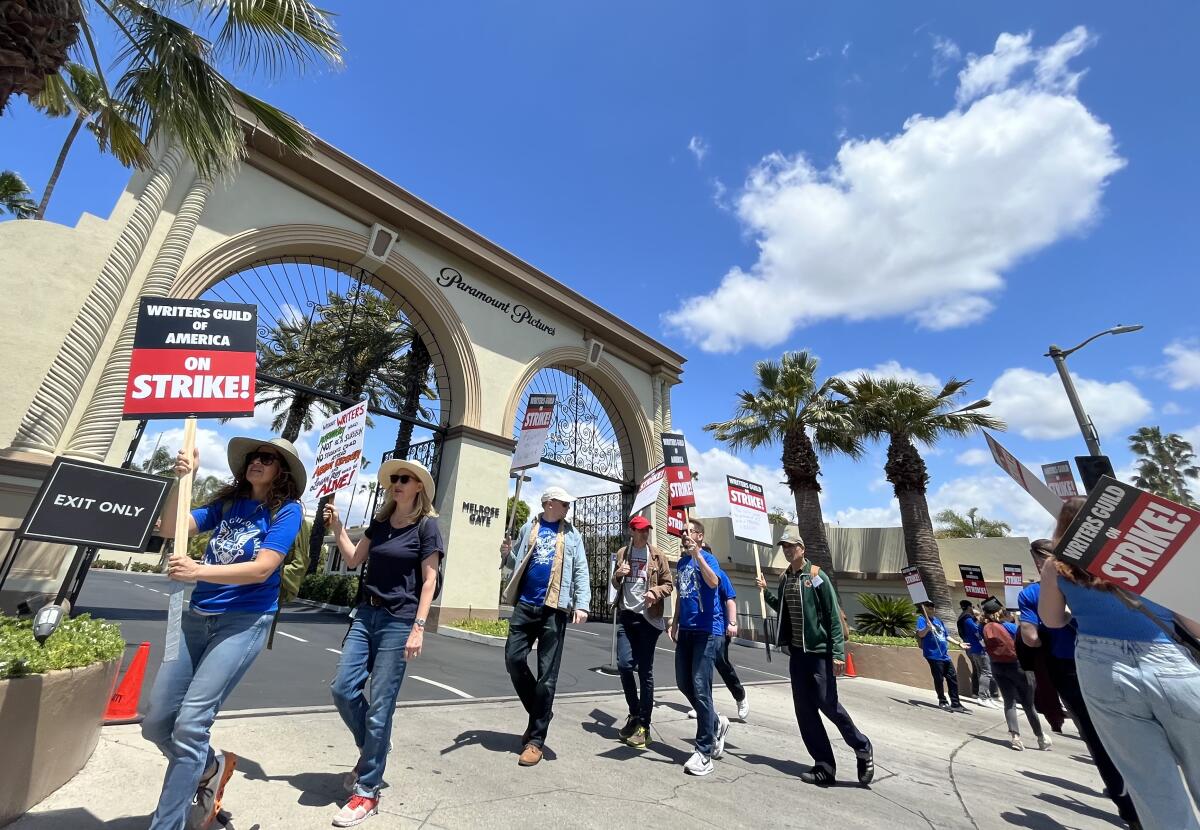
WGA leaders have been largely unsympathetic to their employers’ financial plight, noting that some wounds were self-inflicted.
Paramount, Warner Bros. Discovery and Disney have been struggling with huge debt loads, the result of costly mergers to bulk up their businesses for the streaming future. Inflation and higher interest rates have given those companies less room to maneuver.
“All this talk about doom and gloom, that’s only with us. That’s not what they’re telling Wall Street,” Chris Keyser, co-chair of the WGA’s bargaining committee, said this week as he stood near a column of picketing writers outside Fox Studios in Century City.
“Instead of being the kind of companies that take care of workers, and respect the value they create, they are so focused on squeezing every last drop out of that bottom line that they’ve forgotten where their bread is buttered,” Keyser added.
Layoffs, hints of a recession and an uncertain future for streaming add up to contentious negotiations as the WGA looks for a new deal with Hollywood studios.
The Alliance of Motion Picture and Television Producers, which bargains on behalf of the studios, said the firms are “united in their desire to reach a deal that is mutually beneficial to writers and the health and longevity of the industry.”
The alliance dismissed concerns that Hollywood is morphing into a “gig economy,” saying the writers have little in common with gig workers.
“Writing jobs come with substantial fringe benefits that are far superior to what many full-time employees receive for working an entire year, including employer-paid health care, employer-paid contributions into a pension plan and eligibility for a paid parental leave program,” the AMPTP said Thursday.
Companies had been preparing for a strike, which was authorized in a historic 98% vote last month by the WGA membership.
Analysts are closely watching the labor unrest to determine which companies will be winners — and losers.
In a report this week, Moody’s said movie theater operators and broadcast and cable TV channels could be hurt most should the writers’ strike extend for several months, as some are predicting. The report said cinema chain owners, “already strained from the COVID pandemic and lighter release schedules,” are most at-risk should the movie pipeline be interrupted again.
The 2007-08 writers’ strike, and lingering mistrust between big media companies and their Hollywood workers, has cast a long shadow over current WGA contract talks.
Broadcast TV and the cable networks, which have been wrestling for the last year with a soft advertising market, face increased uncertainty at a time when they have been losing audiences because of pay-TV cord-cutting.
“They’ve got a lot of problems that were already happening,” Brian Wieser, a consultant and longtime advertising analyst, said. “When consumers get away from turning to their legacy cable-TV program guide, they will be less likely to go back.”
Should the traditional TV channels run out of fresh programming, Wieser said that could accelerate consumers’ migration to streaming services — further threatening the broadcast networks and cable channels.
The strike may focus “the minds of advertisers about the challenges that television presents,” Wieser added.
A protracted strike would put the squeeze on smaller film production companies and broadcast TV station owners, as well as major media companies, the Moody’s report said.
“The consequences of a very long strike could prove bothersome and even dire, under certain circumstances, for the many media companies along the food chain that rely on the scripted entertainment content [that] studios produce and that have minimal diversity, minimal sports rights and news programming,” Moody’s said.
Then there’s Netflix, which some analysts believe could actually benefit from a strike.
“We have a large base of upcoming shows and films from around the world that we could probably serve our members better than most,” Netflix Co-Chief Executive Ted Sarandos told investors last month. “We do have a pretty robust slate of releases to take us into a long time.”
Netflix shares held steady this week, closing Thursday at $320.78, up 0.5%.
Amazon and Apple also are protected because their film and TV studios represent a minute fraction of their overall businesses, and their programming options exist largely to drive merchandise sales.
Analysts said any damage should be minimal — so long as the strike is short-lived.
“The longer the strike goes, the more problematic it is for the industry at large,” said media analyst Rich Greenfield of LightShed Partners. “But it also creates unique opportunities.”
For example, companies immediately would save tens of millions of dollars that they otherwise would be spending on production.
“Some [companies] may actually see a short-term boost to cash flow as they did during the pandemic, when production was halted and production working capital spending stopped,” the Moody’s report said.
Some industry insiders said privately that they wouldn’t be surprised to see the strike stretch into July because that’s when media companies could start canceling writers’ deals under the “force majeure” clauses of contracts. Those outs — which allow companies to exit deals due to circumstances beyond their control — would enable studios to shed pricey contracts that have borne little fruit.
“We hope we can come to a resolution that works for everyone fairly quickly,” Bakish said in Thursday’s earnings call. “But it’s fair to say there’s a pretty big gap today,” Bakish said of the positions between the two sides.
More to Read
Inside the business of entertainment
The Wide Shot brings you news, analysis and insights on everything from streaming wars to production — and what it all means for the future.
You may occasionally receive promotional content from the Los Angeles Times.
